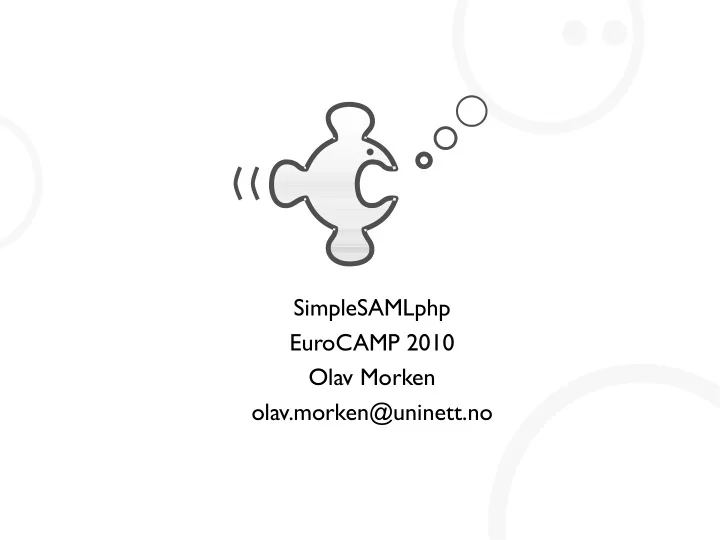

SimpleSAMLphp EuroCAMP 2010 Olav Morken olav.morken@uninett.no
SimpleSAMLphp Mainly a SAML 2.0 Service Provider and Identity Provider 2 Targets the SP lite and IdP lite profiles (with some limitations) Written entirely in PHP Support for several other protocols Support for multiple authentication methods
History Started out as a SAML 2.0 IdP and SP implementation 3 Later extended with partial support for SAML 1.1 Shibboleth 1.3 compatibility Support for several other protocols added (WS-Federation spring 2008) Module support added fall 2008
What it has become Generic SSO platform Targets multiple use-cases 4 Service Provider Identity Provider Bridge / proxy Also between different protocols, e.g. SAML 2.0 ↔ OpenID Federation tools, e.g. metadata aggregator
Goals SSO platform Easy to get started 5 Flexible Extensible
Extensibility Supports extensions through modules Somewhat stable API 6 Mainly two types of extensions Authentication sources E.g. LDAP, SQL, OpenID Authentication processing filters E.g. attribute release consent, attribute modifications
Examples of modules consent - asks the user for permission before releasing attributes to SP ldap - authenticating against LDAP servers 7 sql – authentication against SQL database aggregator – a metadata aggregator openidProvider – An OpenID provider statistics – Statistics viewer, e.g. logins, logouts, consent responses
Protocol support SAML 2.0 & SAML 1.1 OpenID 8 CAS WS-Federation (ADFS)
Authentication LDAP SQL 9 Radius X509 certificates Various other protocols: Facebook Twitter ...
Version 1.7 Should arrive in December Few user-visible changes 10 Mostly changes to the internals: Session handling Lots of fixes to conform more to the SAML 2 specifications
Session handling (1) Problem: Current solution was inflexible 11 Only one “authentication session” for each session Limited us to one SP or IdP per hostname Now supports multiple separate “authentication session” per session Log in and out of various authentication sessions independently
Session handling (2) Makes it possible to support advanced features in future releases 12 Support for complex authentication, e.g. twofactor Different authentication contexts Allows the SP to specify the method of authentication it requires
Session handling (3) Three session handlers: PHP built in session handler 13 Memcache SQL (new in version 1.7) Supports SQLite, MySQL, PostgreSQL Generic SQL – may work with other DBs Can add new handlers through modules SAML 2 SP supports SOAP logout when using Memcache or SQL session store
Conformance fixes In preparation for Kantara Initiative SAML 2.0 Full Matrix Conformance 14 Testing (beginning of 2011) Partially driven by Andreas' automated SAML 2 tester Most fixes were for rarely used features in the SAML 2 specification Could become important in the future
Conformance (before) 15
Future improvements Simpler IdP configuration Better support for working directly 16 with XML metadata Better login UI SAML 2 MDX metadata support Extending the SAML 2 library
IdP configuration (1) The various protocols must currently be configured separately 17 Little interaction between the different SSO protocols Cross-protocol logout difficult The IdP is directly tied to the current hostname → cannot run multiple IdPs on a single hostname
IdP configuration (2) Create a single configuration file for IdPs 18 Enable or disable protocols as part of the IdP configuration
XML metadata (1) XML metadata is the standard format for metadata exchange 19 SimpleSAMLphp currently uses its own internal metadata format, based on arrays We want to move to XML format as standard Simplifies deployment
XML metadata (2) Not everything that can be configured in SimpleSAMLphp can be set in XML metadata Want to allow configuration both directly in XML metadata 20 and in a separate file Allows automated downloading of metadata while keeping local configuration Possibly local configuration based on EntityAttributes in downloaded metadata User experience when adding and editing metadata
XML metadata (3) 21
Login UI (1) Current user-interface experience isn't as good as it can be 22 It takes too many steps to log in: Select to log in Select protocol Select federation Select identity provider Enter username & password
Login UI (2) Should at least be possible to reduce to three steps in most cases: 23 Select to log in Select identity provider Enter username & password
Possibly new UI based on result from Kantara ULX working group 24
MDX support (1) Federations are growing, forming federations of federations. Can end up with several thousand SAML 2 25 entities Most of which will rarely, if ever, speak to each other Full metadata updates waste bandwidth, processing power Better to download the metadata only for those entities that are in use
MDX support (2) MDX is a protocol for downloading just one piece of metadata from a 26 larger set Primarily want support for consuming MDX metadata May also want to support serving MDX metadata in the metadata aggregator
SAML 2 library (1) Currently tied to SimpleSAMLphp Any application that wants to become 27 a SAML 2 SP must include the whole of SimpleSAMLphp Conflict between application session and SimpleSAMLphp session
SAML 2 library (2) Want to make it easier to embed the SP directly into the application Reuse application framework 28 Templates, error handling, session storage Application must take on many responsibilities: Metadata generation, attribute extraction, +++ SAML 2 library handles message generation, parsing and validation
29 Questions ?
Recommend
More recommend